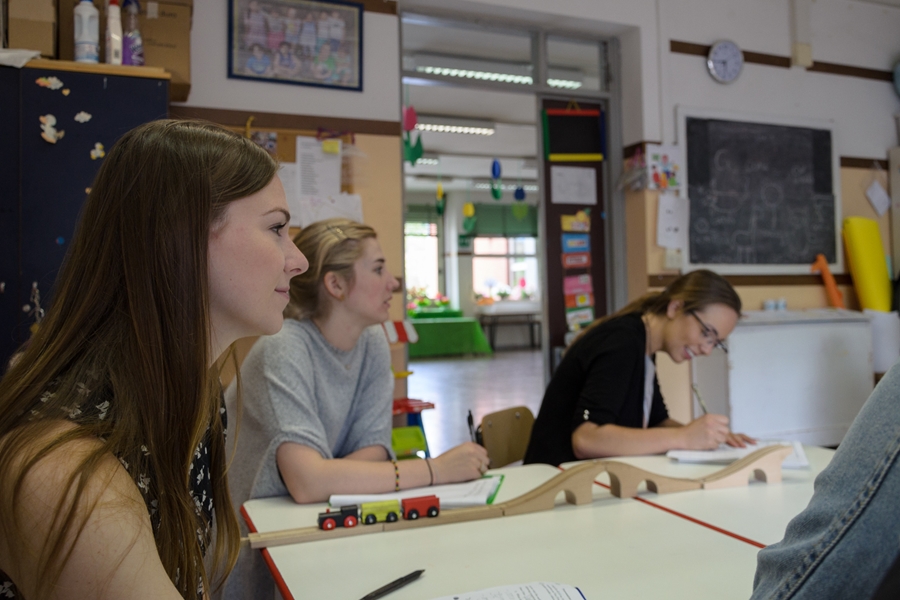FAYETTEVILLE, Ark. - U of A students in the Birth through Kindergarten Teacher Licensure program and other related disciplines on campus discovered the value of study abroad by participating in the first U of A study abroad course on the Reggio Emilia approach last summer.
The two-week, faculty-led international experience included stops in Rome and Reggio Emilia, Italy.
The Reggio Emilia approach to early childhood education has its roots in the Northern Italian town of the same name. The fundamental principles are the understanding that engaging environments establish learning communities within classrooms, the belief that documentation of children's experiences plays a vital role in their learning and a deep commitment to project-based learning through authentic short- and long-term projects. Artistic expression also plays a central role in the Reggio Emilia approach.
While the study abroad experience is geared toward students in the Birth through Kindergarten licensure program, it also appeals to students interested in art in the classroom, those who want to explore the impact of culture on education and anyone wanting to work with children, especially in a classroom setting.
"My eyes, mind and heart were opened up so much while exploring the 'Ray of Light' atelier at the Loris Malaguzzi Center," said Erica Liddell, a human development and family sciences major. "I found myself frustrated because I had forgotten 'how to play.' What I mean is I was caught up with what my end product should look like instead of merely exploring the space out of curiosity. After that day, I left with an admiration for a child's ability to dive right into creating and exploring without hesitation. Because of that, I also believe I learned how adults can possibly hinder children from exploring. When we teach with a certain end product in mind, this can rob children of all they are capable of learning and discovering."
Fifteen students participated in the trip, which was facilitated through the U of A Rome Center and led by clinical assistant professor of human development and family sciences Laura Herold and Shelley McNally, clinical assistant professor and executive director of education programs at the Jean Tyson Child Development Study Center.
The trip combines history and theory with experiential learning. Students hear directly from world leaders in the approach, and experience exceptional early childhood education environments in person.
"I was challenged through the experiences in Rome and Reggio Emilia to not be conformed to one method of guiding and teaching children," said Amber Weigang, a Birth through Kindergarten teacher licensure candidate. "I discovered that I have a great deal to re-evaluate in the way I approach my students, classroom and in the experiences I provide. Being challenged to reconsider a previously held thought or idea is the foundation education is based upon. The story I held of myself before Italy has broadened and deepened from good food and beautiful artwork and buildings to a new way of approaching children and how they learn. This experience taught me that children are capable of far more than I often allow. I have an important responsibility to be a researcher alongside my students and not simply as an instructor to lecture my students."
Birth through Kindergarten is a major and teacher licensure program offered through the School of Human Environmental Sciences in the Dale Bumpers College of Agricultural, Food and Life Sciences. Teacher candidates in the program have the opportunity to put their learning into practice in the Jean Tyson Child Development Study Center, which functions as a model childcare center and lab school for early childhood educators, as well as a center for research and a childcare center for local families. The curriculum used by educators and U of A students in the JTCDSC is inspired by the Reggio Emilia approach. The center, housed in the School of Human Environmental Sciences, provides care for children from ages eight weeks to five years. Teachers and instructors provide developmentally appropriate education for infants, toddlers and preschoolers, meeting their physical, social, emotional and cognitive needs.
"We were thrilled to have been able to take this first cohort of students to Italy to learn about the Reggio Emilia approach and practice the key concepts of design, documentation and discourse," said Herold. "Those students came away forever changed by what they learned and also forever enriched by the study abroad experience."
The course will be offered again in May 2020. Students interested in the trip or the program should contact Herold at lkherold@uark.edu for more information.
About the Dale Bumpers College of Agricultural, Food and Life Sciences: Bumpers College provides life-changing opportunities to position and prepare graduates who will be leaders in the businesses associated with foods, family, the environment, agriculture, sustainability and human quality of life; and who will be first-choice candidates of employers looking for leaders, innovators, policy makers and entrepreneurs. The college is named for Dale Bumpers, former Arkansas governor and longtime U.S. senator who made the state prominent in national and international agriculture.
About the University of Arkansas: The University of Arkansas provides an internationally competitive education for undergraduate and graduate students in more than 200 academic programs. The university contributes new knowledge, economic development, basic and applied research, and creative activity while also providing service to academic and professional disciplines. The Carnegie Foundation classifies the University of Arkansas among only 2 percent of universities in America that have the highest level of research activity. U.S. News & World Report ranks the University of Arkansas among its top American public research universities. Founded in 1871, the University of Arkansas comprises 10 colleges and schools and maintains a low student-to-faculty ratio that promotes personal attention and close mentoring.
Topics
Contacts
Robby Edwards, director of communications
Dale Bumpers College of Agricultural, Food and Life Sciences
479-575-4625,
